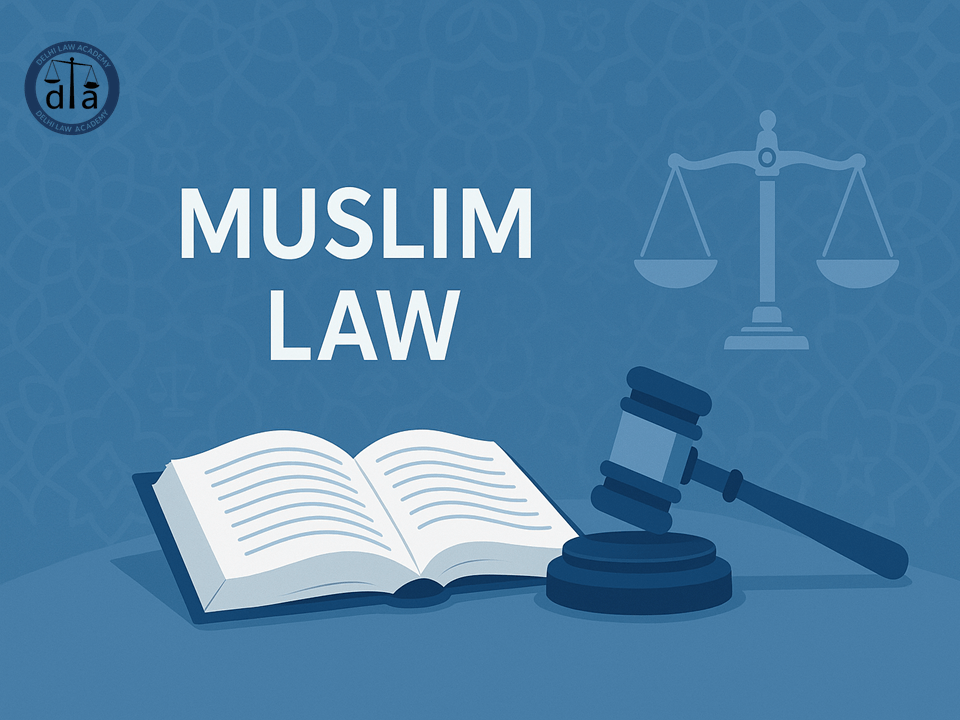
📘 Preparation for RJS, DJS, PCS (J) and other Judicial Service exams
⚖️ MUSLIM LAW
📜 MUSLIM WOMEN (PROTECTION OF RIGHTS ON DIVORCE) ACT 1986
Muslim Law is an important component of most Judicial Service exams in the country. Its thorough knowledge is a must for all aspirants of RJS, DJS, PCS (J) and other Judicial Service exams. To help such aspirants, DELHI LAW ACADEMY JAIPUR has launched a series of study material modules on all important aspects of this important part of their syllabus:
******************
📖 MUSLIM WOMEN (PROTECTION OF RIGHTS ON DIVORCE) ACT 1986
Section 1 – Extent
- This Act extends to whole of India except Jammu and Kashmir
Section 2 – Definitions
- “divorced woman” means a Muslim woman who was married according to Muslim law and has been divorced by her husband under Muslim law or has obtained divorce from her husband according to Muslim law
- “iddat period” in case of a divorced woman means
- three menstrual courses after the date of divorce if she is subject to menstruation
- three lunar months after her divorce if she is not subject to menstruation
- if she is enceinte at the time of her divorce – period between the divorce and delivery of her child or termination of her pregnancy
- “Magistrate” means a Magistrate of First Class exercising jurisdiction under CrPC in the area where the divorced woman resides
Section 3(1) – Mahr or other properties to be given at divorce
- Notwithstanding any other law, a divorced woman shall be entitled to:
- a reasonable and fair provision and maintenance to be made and paid to her within the iddat period by her former husband
- where she herself maintains children born to her before or after her divorce – a reasonable and fair provision and maintenance to be made and paid by her former husband for a period of two years from their respective dates of birth
- an amount equal to mahr agreed to be paid to her at the time of her marriage or thereafter according to Muslim law
- all properties given to her before or at the time of marriage or after the marriage by her relatives or friends or by husband or relatives of husband or his friends
Section 3(2)
- Where a reasonable and fair provision and maintenance or mahr has not been made or paid to a divorced woman on her divorce or her properties have not been delivered to her, she may make an application to a Magistrate for an order for payment or delivery of such dues.
Section 3(3)
- If Magistrate is satisfied that her dues have not been paid, he may make an order within one month of filing of application directing her former husband to pay reasonable and fair provision, mahr or deliver properties.
Section 3(4)
- If any person fails to comply with the order, Magistrate may issue a warrant for levying the amount and may sentence such person to imprisonment up to one year or until payment if sooner made.
Section 4(1) – Order for payment of maintenance
- Where Magistrate is satisfied that a divorced woman has not re-married and is not able to maintain herself after the iddat period, he may order her relatives entitled to inherit her property to pay reasonable and fair maintenance.
- Such maintenance shall be payable by relatives in proportion to their inheritance share.
- If she has children, Magistrate shall order only such children to pay maintenance to her.
- If the children are unable to pay, parents of such divorced woman may be ordered to pay.
- If parents lack means, Magistrate may direct other relatives with means to pay.
Section 4(2)
- If the divorced woman has no relative or such relatives lack means, Magistrate may order the State Wakf Board to pay such maintenance or share of such relatives.
Section 5 – Option to be governed by Section 125 CrPC
- If on the date of first hearing, both parties declare (jointly or separately) that they prefer to be governed by Sections 125–128 CrPC, the Magistrate shall dispose of such application accordingly.
- “Date of first hearing” means the date fixed in the summons for attendance of the respondent.
Section 6(1) – Power to make rules
- Central Govt may, by notification in Official Gazette, make rules for carrying out purposes of this Act.
Section 7 – Transitional provisions
- Every application by a divorced woman u/s 125 or 127 CrPC pending before a Magistrate on commencement of this Act shall, subject to section 5, be disposed of in accordance with this Act.
***********
📚 Continue Your Muslim Law Preparation
Don’t stop here! Strengthen your knowledge of Muslim Law with our blogs:
📘 Free Study Material for Judiciary Aspirants!
Download our FREE study material prepared by Delhi Law Academy’s expert faculty.
📘 Frequently Asked Questions on Muslim Women (Protection of Rights on Divorce) Act, 1986
⚖️ What is the Muslim Women (Protection of Rights on Divorce) Act, 1986 and why was it enacted?
The Act was passed to protect the rights of Muslim women who are divorced by their husbands under Muslim law. It provides for reasonable and fair maintenance, mahr, and custody-related reliefs, ensuring financial and social security after divorce.
📜 What rights does a divorced Muslim woman have under Section 3 of the 1986 Act?
Under Section 3, a divorced Muslim woman is entitled to a fair and reasonable provision and maintenance within her iddat period, payment of mahr, maintenance for her children for two years, and delivery of any properties given to her at or after marriage.
👩⚖️ What can a Muslim woman do if her husband does not pay maintenance or mahr after divorce?
If a husband fails to make the required payments, the divorced woman can file an application before the Magistrate. The Magistrate may order payment within one month and issue a warrant or even sentence the defaulter to imprisonment if he fails to comply.
💡 What happens if a divorced Muslim woman cannot maintain herself after the iddat period?
If she has not remarried and is unable to maintain herself, the Magistrate can order her relatives, children, or parents—based on inheritance rules—to pay her maintenance. If none can pay, the State Wakf Board may be directed to do so.
📚 Can a divorced Muslim woman choose to be governed by Section 125 of CrPC instead of this Act?
Yes. Under Section 5 of the 1986 Act, if both the divorced woman and her former husband declare before the Magistrate (jointly or separately) that they prefer to be governed by Sections 125–128 of the CrPC, the Magistrate shall dispose of the case accordingly.
🏛️ How can Delhi Law Academy help aspirants understand the 1986 Act for judiciary exams?
Delhi Law Academy Jaipur provides comprehensive notes, study modules, and summaries on Muslim Law, including the 1986 Act. These materials help RJS, DJS, and PCS(J) aspirants master key sections, legal definitions, and case law relevance for exams.
Contact us
📍 Delhi Law Academy – Jaipur Branch
6C, Tower 2, Coaching Hub, Pratap Nagar, Jaipur – 302033
📞 Phone:
+91 9911916552
+91 8447285606
✉️ Email:
contactus@delhilawacademy.com

